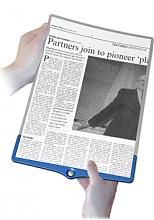Thu September 22 2005
 HarperCollins sends book samples to mobile phones HarperCollins sends book samples to mobile phones
|
|
10:25 PM by Brian in E-Book General | News
MobileReader allows booklovers to read chapter samplers of the latest new release books on their mobile phone simply by logging onto the MobileReader website. Once you've signed up for MobileReader, you'll receive our new release pack each month. You'll also receive our genre pack, depending on the genres you selected when you signed up. We'll let you know what the genre pack is each month, and if you didn't select that genre when you joined, you'll have the option of sending an SMS to request the genre pack anyway. You'll also have the option to unsubscribe from the service. Excerpts from new releases by authors Dean Koontz, Paulo Coelho, and Janine Allis will be among the first sent to subscribers of the service. This won't be the first time HarperCollins have used mobile phones to reach customers. In August, HarperCollins Children's Books UK launched the Meg Cabot Mobile Club where fans can get messages from the author, news, polls, and special offers sent directly to their phones. Instead of fighting mobile technology, HarperCollins appears to be embracing it in unique and novel ways to promote their books. Let the comments on the name begin! MobileReader? [via textually.org and MocoNews] |
|
[ 3 replies ] |
 Newspapers feeling the heat in the digital age Newspapers feeling the heat in the digital age
|
|
06:33 PM by Brian in E-Book General | News
In an ironic twist, MSNBC is running a story from the September 26, 2005 issue of Newsweek International Edition about how reading is declining as visual media takes off. Visual media are, if anything, a more natural mode for humans than the written word, at least according to neuroscientist Marcel Just of Carnegie Mellon University in Pittsburgh, Pennsylvania. David Rothman from TeleRead weighs in: Digitizing books isn’t enough; we need linking, multimedia, you name it, to keep books popular in a Net-oriented era. P-publishers and authors should spend less time whining and more time adjusting to the new realities. I myself am an old-time text guy and will do all I can to encourage reading. But to ignore multimedia, in 2005, to the extent that most newspapers have, is sheer folly. Book publishers should heed the lesson. Is reading text on paper, as these two articles would suggest, a dying form of media in the digital age? Is visual digital media a better, more natural way to tell a story and provide information? Related: E-books could be more than just type |
|
[ 3 replies ] |
 Treo 700w aka Treo 670 - Engadget has it! Treo 700w aka Treo 670 - Engadget has it!
|
|
03:56 PM by Alexander Turcic in Archive | Handhelds and Smartphones
Thanks to Laurens for the find of the day! |
|
[ 2 replies ] |
 Sunrise 0.42f released Sunrise 0.42f released
|
|
04:35 AM by Laurens in Archive | Sunrise This release fixes a serious bug introduced in version 0.42e. Embedded images with an alternate full-size version would not be properly included in the Plucker documents. The result was that many images would appear to be missing from the documents. Download Windows version (PalmGear) Download Linux/GTK version (Sunrise weblog) If you are new to Sunrise, click here to find out more about its top-notch features for website offline conversion. |
|
[ 0 replies ] |
Wed September 21 2005
 Free file hosting service offers 1GB of storage Free file hosting service offers 1GB of storage
|
|
09:47 PM by Brian in Miscellaneous | Lounge
eSnips is the easy FREE way to snip, store online and easily share anything you want:
eSnips is currently in Beta and is only available to Windows users running Internet Explorer, but Firefox support is reportedly coming soon. [SearchEngineWatch via Smart Mobs] |
|
[ 0 replies ] |
 Authors Guild alleges Google's Library Project violates copyrights Authors Guild alleges Google's Library Project violates copyrights
|
|
08:34 PM by Brian in Miscellaneous | Lounge
The Authors Guild and a Lincoln biographer, a children's book author, and a former Poet Laureate of the United States filed a class action suit today in federal court in Manhattan against Google over its unauthorized scanning and copying of books through its Google Library program. The suit alleges that the $90 billion search engine and advertising juggernaut is engaging in massive copyright infringement at the expense of the rights of individual writers. In response, Google has gone on the offensive in a post on the Google Blog, which includes in part: Let's be clear: Google doesn’t show even a single page to users who find copyrighted books through this program (unless the copyright holder gives us permission to show more). At most we show only a brief snippet of text where their search term appears, along with basic bibliographic information and several links to online booksellers and libraries. Google Print offers readers the ability to find books on subjects and keywords that would otherwise go unnoticed, thereby creating newfound demand for titles gathering dust in the truest sense of the long tail. It's a shame that the Authors Guild is clinging to innovation averse, old modes of thinking to the detriment of their members, the industry, and the readers of the world. David Rothman at Teleread has more on the subject. |
|
[ 19 replies ] |
 Track Yahoo Finance message boards via RSS Track Yahoo Finance message boards via RSS
|
|
08:33 PM by Alexander Turcic in Miscellaneous | Lounge
Your suggestions are always welcomed. |
|
[ 16 replies ] |
 Is technology making us less intelligent? Is technology making us less intelligent?
|
|
06:56 PM by Brian in Miscellaneous | Lounge
C|Net has published the first article in a series on the topic of Intelligence in the Internet age. Several important figures in the technology field weigh in on the subject including Jeff Hawkins, the co-inventor of the Palm Pilot, Treo smartphone, and author of the book On Intelligence. From the article: Working with the Treo handheld computing device he helped create, Jeff Hawkins can easily recount exactly what he did three years ago on Sept. 8, factor 9,982 and Pi, or describe a weather system over the Pacific Ocean. But without his "smart" phone, he can't recall his daughter's telephone number offhand. Is technology making us smarter or dumber? Please vote in the poll and weigh in on the subject in the discussion thread. Read the full article here. |
|
[ 33 replies - poll! ] |


 HarperCollins Publishers in Australia and
HarperCollins Publishers in Australia and  In an
In an 
 The Authors Guild, a professional organization for published writers, has filed a class action suit against Google claiming the
The Authors Guild, a professional organization for published writers, has filed a class action suit against Google claiming the  Has technology affected our intelligence for the better or worse? Many would argue that technology has freed us from memorizing trivial information, allowing us to use our intellect in more meaningful ways. Others would argue that as we store more phone numbers, names, appointments, and to-do lists in our devices, our intelligence and memory are suffering the consequences. Do we rely too much on technology and use our brains less than we should?
Has technology affected our intelligence for the better or worse? Many would argue that technology has freed us from memorizing trivial information, allowing us to use our intellect in more meaningful ways. Others would argue that as we store more phone numbers, names, appointments, and to-do lists in our devices, our intelligence and memory are suffering the consequences. Do we rely too much on technology and use our brains less than we should?  Latest E-Books
Latest E-Books

